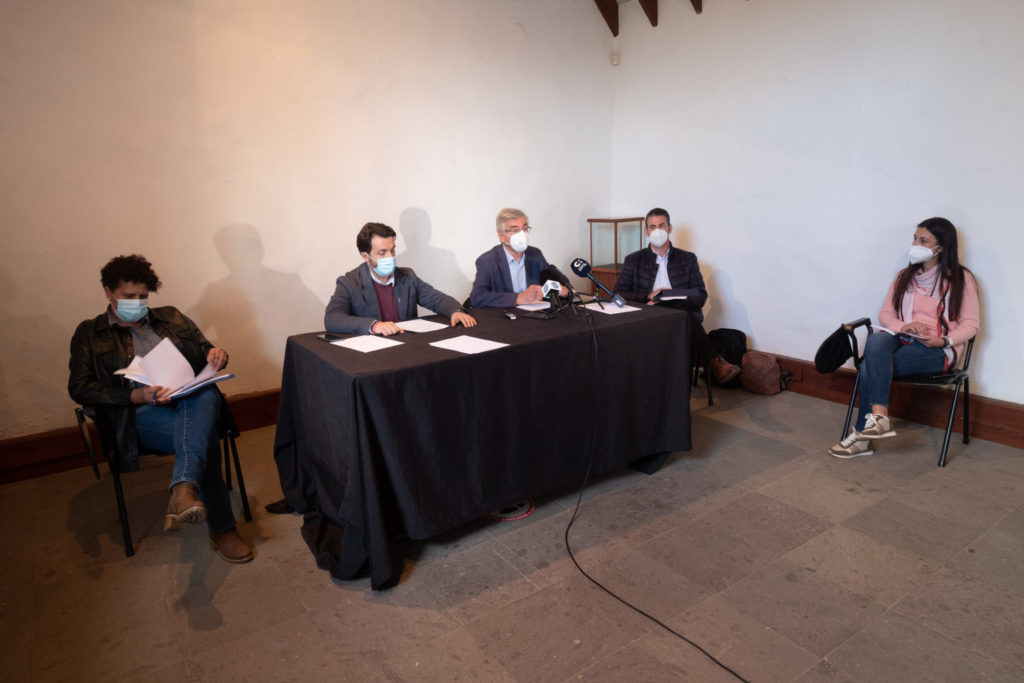
Limit the participation of the opposition and its oversight of the work of the government. That is the end of the Tripartite (Nueva Canarias, PSOE and Sí se puede) in the Tacoronte City Council with the initial approval of the new municipal organic regulation, as reported yesterday by the spokesmen for the PP and CC groups, José Caro and Álvaro Dávila respectively , and the three non-attached mayors, Carlos Medina and Sandra Ramos (former PSOE) and Candelaria Dorta (former Cs).
The five appeared at a joint press conference to criticize the lack of consensus and dialogue when approving the law, which according to them they learned of shortly before it was debated in the corresponding information commission, “except for some cases out of deference”, in allusion to Cs who supported him.
“Or do you think that the government presented it on the same day without being sure that it would be approved by a majority?” Dávila quipped, adding that “it tries to limit our inspection work because it establishes limitations that are not contemplated or in the Canarian Law of Municipalities, nor in the Law of Bases of the Local Regime nor in the Regulation of Organization and Functions (ROF).
The new regulation limits the number of questions, motions, pleas and appearances, which must be requested 15 business days in advance, as well as the time of participation in the plenary sessions according to political representation.
In the case of non-attached councilors “the limitation is extraordinary” despite the fact that they have the right “like anyone else” to transfer all the initiatives they consider necessary.
José Caro gave the example of the mixed group, made up of two formations, PP and Sí se puede -the latter in turn makes up the government- that must divide the established time both in the interventions (half of the rest), and in the questions (only two are allowed) and a full request to each one.
For his part, Carlos Medina acknowledged that it is a necessary document to improve the legislation of the governing bodies “but the essence of the pact that was signed in 2019 between the three political formations is flagrantly breached, when one of its main characteristics was transparency and citizen participation”, said the mayor who was one of those who signed the agreement after the municipal elections.
Finally, Candelaria Dorta believed that the document “is more typical of a Franco era than of a democratic state because the non-attached councilor is punished. The Law of Canarian Municipalities is broader than this pre-democratic regulation”, he said. In his case, he left Cs voluntarily, with which “I am not a turncoat”, he insisted, and I have transferred questions in plenary on the different issues in which citizens demand a solution.
In this sense, the five reproached Cs for his support for the norm and argued that this is because “he does not oppose” and therefore wants to limit what the rest of the groups do.
For all these reasons, they demanded that the Government chaired by José Daniel Díaz reconsider its position, leave the new regulation on the table and create a commission to try to agree on it, since it is not the best political situation to approve a document that may have a validity of 20 or 30 years.
Tacoronte Participa calls for more political dialogue to seek other alternatives
The Tacoronte Participa citizen platform shows its agreement with the existence of internal operating regulations both in plenary sessions and in other works to coordinate and streamline the procedures of the City Council. But “never violating the rights of democracy and going over the opinion of the people or their legally elected representatives. That all of them have the same right of representation before the citizens and that the time and spaces must be equal, to give those who have chosen them the option to see themselves represented in the same way”.
The platform considers that the way chosen to present and prepare it “has not been the most participatory or appropriate” and hopes that the government group chooses to dialogue and seek other more appropriate and democratic alternatives.
















